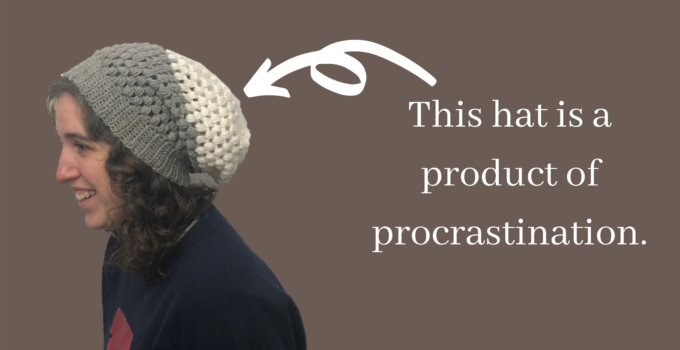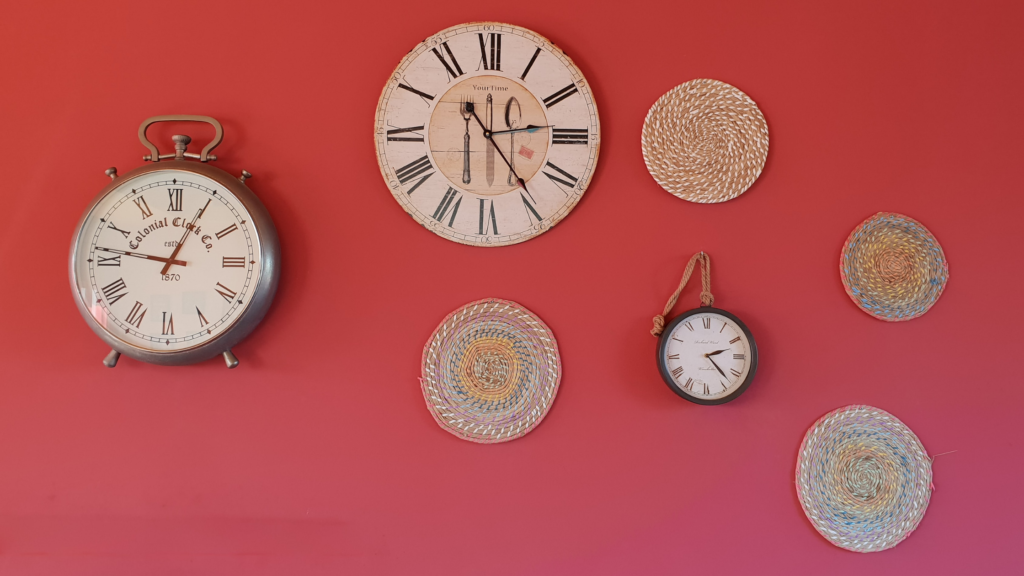I am a procrastinator. I always have been and always will be. The lead image is a hat that I made while I was procrastinating writing. But as I’ve gotten older, I’ve noticed that nearly everyone will say that they procrastinate sometimes, but there are lots of different types of procrastination.
The Science Behind Procrastination
On a neurological level, procrastination is a way for our brain to avoid something we anticipate being unpleasant. That unpleasantness can include boredom, embarrassment, or anxiety about outcomes. It took me a long time to admit that my procrastination habit wasn’t an inherent personality trait – I was choosing to avoid the activities. I even procrastinate on things that I want to do!
So I did some googling to see if there was some research out there on procrastination, and most of it was focused on active vs passive procrastination (do you mean to put it off or not?), and the rest is very self-help-y listicles about types of procrastination.
But I found this article by Dr. Ellen Hendrickson that seemed more informed about what actually drives procrastination and how to deal with it.
The Three Types of Procrastination
According to Hendrickson, there are three kinds of procrastinators. Each of them have different scenarios when procrastination comes up in their life. And the article subtitle is, “Which One Are You?” and, reading through it, I can confidently say, “All of them.”
The Avoider
This is standard, garden-variety procrastination. The Thing You Must Do is hard or confusing or annoying or you’re afraid you’ll fail, so you don’t do it. In fact, you do everything BUT it. I was procrastinating so hard this week, I crocheted that hat in three days.
But Hendrickson points out another cause of avoiding: not knowing what to do next! There are plenty of things on this blog that plague me because I know I should do them, but I get overwhelmed when I make time to do them….so I do something else.
The Optimist
This is an active procrastinator gone wrong. An active procrastinator knows that the pressure of a deadline will motivate them to complete it, so they deliberately put off starting it. The key here is that an active procrastinator plans when they’ll complete the task and has a reasonable estimate of what it will take to get it done.
Not so for the Optimist! They are the ones thinking they can clean the whole house before their 9am meeting, or start an elaborate handmade Halloween costume on the 28th. This is me with every paper I’ve ever written. It only takes a couple hours to write 6 pages, right? (Wrong.)
The Pleasure-Seeker
This is procrastination when you just don’t want to do The Thing. That one extra Netflix episode or playing one more level of Candy Crush is usually driven by a Pleasure-Seeker’s brain.
The consequences for this type of procrastination tend to be more personal. There’s generally enough social pressure at work to curb most of this type of procrastination. But unless your mother is coming over for dinner, it’s harder to get off the couch to keep your home clean. And the consequences often manifest in a fed-up partner taking care of chores (this is a personal anecdote).
Tips for All Types of Procrastination
I don’t know if it’s getting older, being jobless for a while, or being stuck at home so long with quarantine, but I’m really starting to examine some of my self-imposed pressures around being productive. As a result, some of the listicles that I read on this topic really got my hackles up.
But the fact remains that beating procrastination is important for functioning in our society. But note that I didn’t call this section “tips for BEATING procrastination”. Sometimes, I think leaning into procrastination is the way to go. I’ll explain below.
Know when to relax
Sometimes, you just don’t have it. You’re having a day that you just need to survive instead of thrive. And that’s ok.
As a matter of fact, allowing your brain time to drift will actually kick it into the diffuse mode. That’s when your brain deepens connections on new information and draws new connections with existing information. I learned about it in the Learning How To Learn Coursera, but it’s a good argument for giving your brain a break every now and then.
And for pity’s sake, don’t beat yourself up about sitting down! I saw an article that said that people waste 55 days per year procrastinating. And that pissed me off because it’s implying that whatever you were doing while you’re procrastinating has no value. Which is a flawed assumption – sure, some time is truly wasted, but most types of procrastination have some benefit to the procrastinator!
Try setting Start Dates instead of Deadlines
If you are a habitual procrastinator (like me), try focusing on when you’re going to start on a project instead of when you’re going to finish it. I haven’t tried it out yet, but I’m excited to. I know that my perfectionism stands in my way often, causing me to avoid starting projects. But I think it might be useful for my latest system to give this a try!
Identify if you’re avoiding or if you should quit
Some tasks you have to push through and finish. Like cleaning your apartment or that one data collection project at work. But if we’re talking about something you’re doing in your spare time and you’re still procrastinating, you might consider if you should quit entirely.
The way to tell if you should quit or continue is by stating why you want to finish whatever it is you’re working on. I struggle with quitting books that I don’t enjoy. But last month, I read a third of a biography of Catherine the Great and realized I don’t care about the political machinations of 18th-century Russia. And I was only trying to finish it because I wanted to know about her life. So I abandoned the book. Maybe I’ll get back to it someday (it gets great reviews), but now is not that time.
Try “Unscheduling”
If you procrastinate because you’re too tired to start new projects, you might be overscheduling yourself. A fun tip I found (that I want to try) is to schedule in your free time first and then fill in your obligations around that.
During COVID times, it’s especially important to draw a firm boundary between work and recreation. Prioritizing your down time is one way to make sure you’re getting enough of it.
Break your List into Smaller Pieces
If you try and transition to a project, but find your brain immediately sliding out of focus and coming up with three other things to work on, you might be overwhelmed by the project at hand. This is something I do a LOT. If a task has been on my personal scrum for several weeks in a row with no progress, it’s a signal that I need to break it into smaller pieces.
For example, I have a toll bill in Washington that I haven’t paid yet (embarrassing, but true). I know it’s there, but I don’t have the reference number to log in and pay it. It’s been on my list for the past year. This week, I finally decided to figure out what their customer service number is so that I can get moving on the project.
Now that I have the number, I can put “call the number” on my list – which is a much easier action than “figure out and pay toll bill”.
Pay attention to the consequences
This is a longer-term behavior change that can help you reduce your procrastination going forward. Often, whether we realize it or not, some types of procrastination are fueled by perfectionism. To move past that, take some time and identify a scenario when you didn’t do a perfect job. Maybe a report at work was mediocre, or you did the bare minimum one week. Next, examine the consequences of that scenario.
Usually, you’ll find that…nothing happened. You’re likely working at a high level already, so being acceptable instead of exceptional didn’t raise any eyebrows.
If you take the time to record the consequences of average work, over time your brain will stop urging you to constantly push yourself to do more. Now, I’m not saying you should abandon your ambitions! But maybe you shouldn’t be so hard on yourself to be perfect all the time. Relaxing your standards on something you’re procrastinating might just help you get it done (and out of your mind for good!)
I hope some of these tips are useful. I’ll probably never shake the habit of all these types of procrastination, but that doesn’t mean I won’t try!




